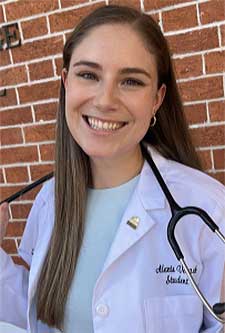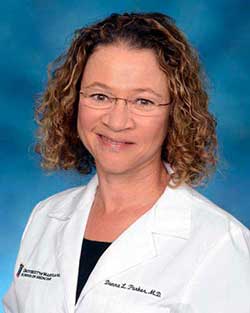June 29, 2023 | Lauren Wright
Alexis Vetack, MS2, is one of 13 medical students selected to spearhead summer research projects that support humanistic health care in underserved communities
 University of Maryland School of Medicine (UMSOM) medical student, Alexis Vetack, MS2, is one of 13 students selected as 2023 Gold Student Summer Fellows by the Arnold P. Gold Foundation. Fellows will spearhead research and service projects that amplify humanistic healthcare and help address health inequities that involve direct interaction with patients and community members. The fellowship provides the opportunity for medical students to deepen their understanding of health inequities and direct attention toward community health needs in underserved populations.
University of Maryland School of Medicine (UMSOM) medical student, Alexis Vetack, MS2, is one of 13 students selected as 2023 Gold Student Summer Fellows by the Arnold P. Gold Foundation. Fellows will spearhead research and service projects that amplify humanistic healthcare and help address health inequities that involve direct interaction with patients and community members. The fellowship provides the opportunity for medical students to deepen their understanding of health inequities and direct attention toward community health needs in underserved populations.
“There are so many challenges in American health care. From burnout to the changing economy and rising health inequities, this is not a time for waiting. It is a time for action,” said Ann Bruder, Associate Vice President of Programs at the Gold Foundation. “Each student fellowship focuses on improving the health and well-being of underserved and underrepresented populations. The fellowships offer numerous benefits ranging from prioritizing community health to placing students in situations where they can learn from the lived experiences of patients and families. These projects will help pave the way for progress for so many families and communities.”
Ms. Vetack’s research project will focus on improving the capabilities for early detection of sickle cell disease among the immigrant and refugee population in Baltimore, Maryland. Participants include children and individuals between 1-20 years of age who are immigrants, refugees, and asylum seekers from high-risk countries located in the regions of Africa, the Mideast, the Caribbean, and India. By utilizing a low-cost hemoglobin screening, Ms. Vetack will assess whether the subjects in Baltimore and the surrounding area have a previously undiagnosed sickle cell trait or disease. Individuals identified as having SCD will be advised on appropriate treatment centers and next steps. Following the screening process, primary caregivers will be given a validated survey tool to explore if healthcare access barriers were present in preventing patients from obtaining the care they needed.
 “We are thrilled that Alexis was selected for this very competitive fellowship from a large pool of highly motivated and qualified medical students from across the country,” said Donna L. Parker, MD, FACP, Professor of Medicine and Senior Associate Dean for Undergraduate Medical Education. “Summer research fellowships such as this offer students a unique opportunity to actively contribute to addressing health inequities, promote humanistic healthcare, and gain practical experience in working with underserved communities.”
“We are thrilled that Alexis was selected for this very competitive fellowship from a large pool of highly motivated and qualified medical students from across the country,” said Donna L. Parker, MD, FACP, Professor of Medicine and Senior Associate Dean for Undergraduate Medical Education. “Summer research fellowships such as this offer students a unique opportunity to actively contribute to addressing health inequities, promote humanistic healthcare, and gain practical experience in working with underserved communities.”
See the full list of 2023 Gold Student Summer Fellows.
About the University of Maryland School of Medicine
Now in its third century, the University of Maryland School of Medicine was chartered in 1807 as the first public medical school in the United States. It continues today as one of the fastest growing, top-tier biomedical research enterprises in the world -- with 46 academic departments, centers, institutes, and programs, and a faculty of more than 3,000 physicians, scientists, and allied health professionals, including members of the National Academy of Medicine and the National Academy of Sciences, and a distinguished two-time winner of the Albert E. Lasker Award in Medical Research. With an operating budget of more than $1.3 billion, the School of Medicine works closely in partnership with the University of Maryland Medical Center and Medical System to provide research-intensive, academic, and clinically based care for nearly 2 million patients each year. The School of Medicine has nearly $600 million in extramural funding, with most of its academic departments highly ranked among all medical schools in the nation in research funding. As one of the seven professional schools that make up the University of Maryland, Baltimore campus, the School of Medicine has a total population of nearly 9,000 faculty and staff, including 2,500 students, trainees, residents, and fellows. The combined School of Medicine and Medical System (“University of Maryland Medicine”) has an annual budget of over $6 billion and an economic impact of nearly $20 billion on the state and local community. The School of Medicine, which ranks as the 8th highest among public medical schools in research productivity (according to the Association of American Medical Colleges profile) is an innovator in translational medicine, with 606 active patents and 52 start-up companies. In the latest U.S. News & World Report ranking of the Best Medical Schools, published in 2021, the UM School of Medicine is ranked #9 among the 92 public medical schools in the U.S., and in the top 15 percent (#27) of all 192 public and private U.S. medical schools. The School of Medicine works locally, nationally, and globally, with research and treatment facilities in 36 countries around the world. Visit medschool.umaryland.edu
Contact
Office of Public Affairs
655 West Baltimore Street
Bressler Research Building 14-002
Baltimore, Maryland 21201-1559
Contact Media Relations
(410) 706-5260
